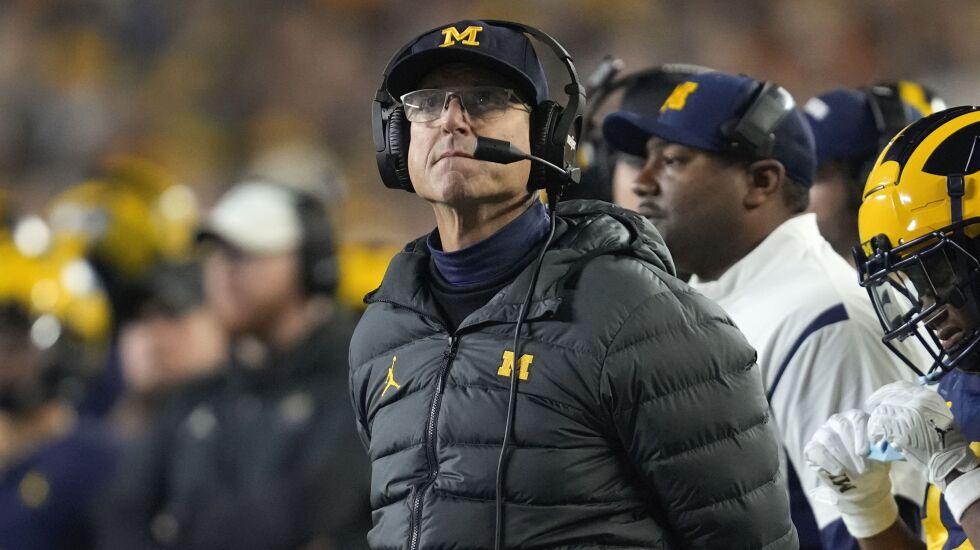
The University of Michigan football program is charged with stealing signs from opposing teams and is accused of impermissible in-person scouting. The NCAA opened an investigation and the Big Ten Conference suspended head coach Jim Harbaugh for the final three games of the regular season.
Michigan sued to block the suspension, but the day before a scheduled court hearing, the university dropped its case while noting that “the Conference has confirmed that it is not aware of any information suggesting Coach Harbaugh’s involvement in the allegations.”
The NCAA action continues, but why all the angst? Isn’t sign stealing just typical gamesmanship? And why did Michigan suddenly drop its own lawsuit?
From sports to politics, cheating is as old as competition. It even has a sentimental place in sports lore (“If you ain’t cheating you ain’t trying”). Yet the current signal stealing scandal seems serious and threatens to take down the school’s championship hopes, if not more. What has changed?
There has always been good cheating and bad cheating. NFL linemen are taught to illegally hold without getting caught, NBA players flop to get foul calls, and baseball has long tolerated deception from framed pitches, sign stealing and illegal spitballs.
During a 22-year career, Hall of Fame pitcher Gaylord Perry notched 314 wins and was widely known for his spitball prowess. He actually autographed Vaseline jars and even named his autobiography “Me and the Spitter.”
When the Giants’ Bobby Thomson famously clubbed a walk-off home run to win the 1951 pennant, he also scored a wink-and-a-smile victory for sign stealing. Yet, when the Houston Astros utilized a sign-stealing system to help reach and then take the 2017 World Series, they were not only punished severely by Major League Baseball when the scheme was exposed in 2019, they were excoriated by the press and the public. They still are.
The main difference lies in the type of cheating. Framed pitches, trapped balls and the illegal spitter are all done in the open and are accepted as part of the game. A runner on second is even expected to steal signs from the catcher, but this is widely known and opposing players change the pitching signs accordingly.
The Astros 2017 scandal and the 1951 Giants outfield telescopes were both used in secret, but the elaborate Astros system was so contrived with scopes, live feed videos and a shameless sound relay system to batters that it shocked even baseball’s conscience.
Now the American public is worn down by relentless shenanigans from the Astros in baseball to political gamesmanship, voter suppression, multiple alleged criminal conspiracies and even a mob attack on the U.S. Capitol. America has lost patience. The recent tsunami of lies and attacks has overwhelmed the prior romance of cheating, even in sports. And now Michigan may have to pay a price if the NCAA finds its football program benefited from a three-year cheating scheme.
Meanwhile, the NCAA has its own history with fairness issues. It has been sued multiple times for antitrust claims.
In 1999 it agreed to pay $54.5 million in compensation for fixing the salaries of assistant coaches.
In 2005, the NCAA bought out the competing National Invitational basketball tournament for $56.5 million to sidestep an NIT antitrust lawsuit for limiting games and squeezing it out of extended tournament play.
On Nov. 4, a federal judge granted class certification for NCAA athletes to pursue antitrust claims for being prohibited from earning compensation for use of their names, images and likenesses in a pending $1.3 billion case.
In 1996, the NCAA even threatened to revoke the football scholarship of Northwestern’s star running back and Heisman candidate Darnell Autry for accepting a part in a movie. Autry fought back successfully, pointing out that he was a Northwestern theater major and that earning a film role was precisely the point of his academic studies.
Today, the national mood is bitter and has less tolerance for unfairness. With the NCAA investigating Michigan football, why did Michigan suddenly give up its case against the Big Ten suspension?
It could be trying to avoid an escalation to placate the NCAA while it determines Michigan’s fate. Maybe it doesn’t want to risk delaying the suspension into the postseason. It may also know that any evidence adverse to Michigan could come out during a continuing court battle while the NCAA considers its own action.
If the NCAA rules harshly against Michigan, it might be somewhat disingenuous, all considered, but that would be the price for allegedly breaking the rules for too long. A weary public might even agree.
Eldon Ham is a member of the faculty at IIT/Chicago-Kent College of Law, teaching sports, law and justice. He is the author of five books on the role of sports history in America.
Columnist Gene Lyons is taking the day off.
The Sun-Times welcomes letters to the editor and op-eds. See our guidelines.
The views and opinions expressed by contributors are their own and do not necessarily reflect those of the Chicago Sun-Times or any of its affiliates.







